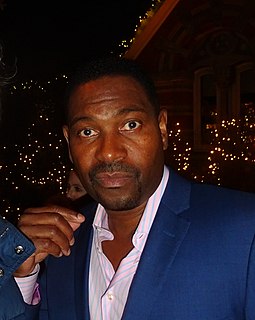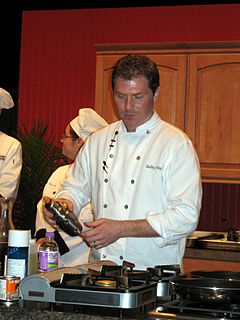A Quote by Jean-Georges Vongerichten
There is so much more vegetable use in Thailand, India and China than meat. Yes, when you go to the markets or buy street food, you see shrimp or chicken - but mostly vegetables.
Related Quotes
It is a great delusion to suppose that flesh-meat of any kind is essential to health. Considerably more than three parts of the work in the world is done by men who never taste anything but vegetable, farinaceous food, and that of the simplest kind. There are more strength-producing properties in wholemeal flour, peas, beans, lentils, oatmeal, roots, and other vegetables of the same class, than there are beef or mutton, poultry or fish, or animal food of any description whatever.
Anyway, like I was saying, shrimp is the fruit of the sea. You can barbecue it, boil it, broil it, bake it, sautes it. There's, um, shrimp ka-bobs, shrimp creole, shrimp gumbo, pan-fried, deep-fried, stir-fried. There's pineapple shrimp, lemon shrimp, coconut shrimp, pepper shrimp, shrimp soup, shrimp stew, shrimp salad, shrimp and potatoes, shrimp burger, shrimp sandwich... That's, that's about it.
I am against portraying China as the demon of the global community. China has grasped more quickly than other countries what globalization means and what it demands. The country has learned how to use other people's innovations for itself. India, incidentally, is not far behind China in this respect. Both are not nations in the European sense, but rather cultural communities with enormous markets. The challenge of the future is to work out how to deal with that.
If you like eating meat but want to eat ethically, this is the book for you. From the hard-headed, clear-eyed, and sympathetic perspective of butchers who care deeply about the animals whose parts they sell, the customers who buy their meats, and the pleasures of eating, this book has much to teach. It’s an instant classic, making it clear why meat is part of the food revolution. I see it as the new Bible of meat aficionados and worth reading by all food lovers, meat-eating and not.
The near end of the street was rather dark and had mostly vegetable shops. Abundance of vegetables - piles of white and green fennel, like celery, and great sheaves of young, purplish, sea-dust-coloured artichokes . . . long strings of dried figs, mountains of big oranges, scarlet large peppers, a large slice of pumpkin, a great mass of colours and vegetable freshness. . . .
The thing that makes me most optimistic is China and India - both of them doing well. It's amazing how much progress there's been in China, and also India. Those are the places that really matter - they're half of the world's population. They're the places where things are enormously better now than they were 50 years ago. And I don't see anything that's going to stop that.






































